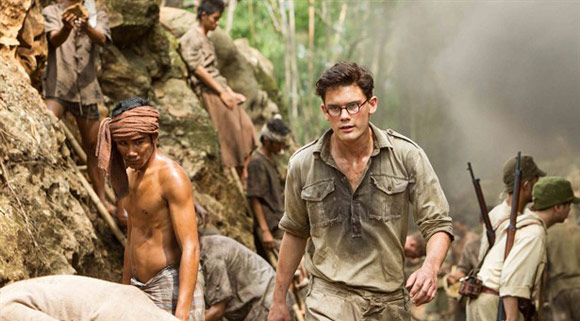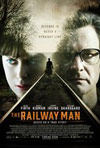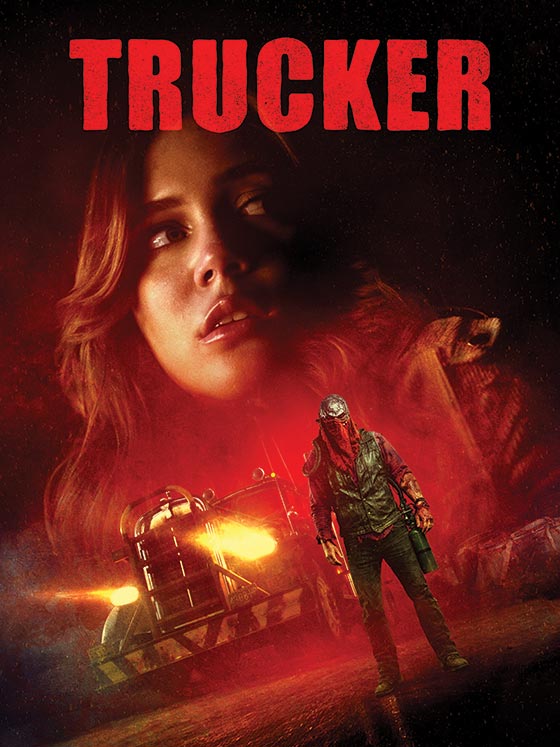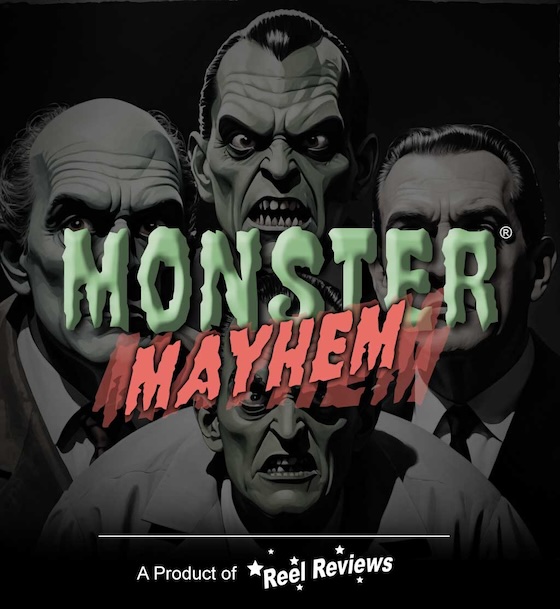Movie Review
Film Details
Blu-ray Review
Trailer

{googleAds}
![]()
In 1957’s The Bridge on the River Kwai, filmmaker David Lean gave us an entertaining – yet totally inaccurate – account of the hardships endured by Japanese-held POWs as they were forced to build the Thai/Burma “Death Railway” during WWII. In reality, there is no bridge and there is no river Kwai as depicted in that movie, however, we were given superficial glimpses of the torture and brutality those men faced, but nothing that approached the reality of what was discovered years after the end of the war.
In The Railway Man, Jonathan Teplitzky and screenwriter Frank Cottrell Boyce give a much more sobering look at those hardships through the eyes of a man who experienced it first hand. They adapt Eric Lomax's memoirs of a British Army officer who is tormented as a prisoner of war at a Japanese labor camp during World War II. Lomax and over 180,000 Asian civilian laborers, and over 60,000 Allied prisoners of war were forced to work on the railway that was to stretch some 250 miles between Bangkok and what was then called Rangoon, Burma. The British had set out to build the railroad 40 years earlier but abandoned the project due to the rough terrain – that carved through mountains and jungle – the climate, health conditions and the sheer difficulty of the logistics. Of those who worked on the railway, an estimated 100,000 died as a direct result.
Of course, these numbers are quite staggering and emphatically hammer home the intensity and impact of the physical and emotional pain these men must have endured. Unfortunately, that same intensity is never quite felt in Teplitzky’s film. Despite its melodramatic tendencies, it chugs and strains to find a strong and lasting emotional connection with an audience watching the tragedy unfold on the screen, while never feeling the total impact of it in our hearts. That said, The Railway Man is an important film that needs to be seen if, for no other reason, than to shine a light on a mostly unknown atrocity of war, the scars of which still disfigure the Earth’s surface. Plus, there’s enough good stuff going on to make this a recommended watch for military enthusiasts and war film buffs.
We first meet Eric Lomax sometime in the 1980s when the aging train aficionado (Colin Forth) meets and falls in love with Patti (Nicole Kidman) while, ironically enough, the two are commuting on a train. She’s a demure nurse who interprets his gruffness as an endearing charm and his love of trains as a nerdy eccentricity. The two are soon married, but Patti’s concerns about her husband’s intensifying bouts of depression leads her to dig deeper by persuading Eric’s friend, Finlay (Stellan Skarsdaard), who she knows was with him on the Thai-Burma railway project, to provide insight into Eric’s worsening mental condition.
This main timeline is intercut with the POW sequences that offer horrifying glimpses into the abysmal conditions the slaves were forced to endure. The screenplay shuttles between past and present, Eric’s struggles with everyday life and his wife’s desperate attempts to get him help.
Although the wartime flashbacks do wield plenty of raw, emotional power, Teplitzky flinches, too often cutting away from the historic brutality in favor of a more easily digestible balance of darkness and light. Perhaps it’s this reluctance to tip over into Mel Gibson Passion of the Christ excess that neuters the film’s ultimate impact. There’s certainly a fine line to walk between the darkness of the film’s heart and the light of its ultimate outcome, but Teplitzky never ultimately finds that perfect balance.
Firth capably handles his Lomax who struggles to sleep at night, haunted by an obsession for revenge. The discovery of a newspaper clipping revealing the fact that Takashi Nagase (Horoyuki Sanada), the Japanese interpreter who oversaw Eric’s torture, is still alive sends Lomax back to Thailand to confront his demons.
Though the real Eric Lomax was somewhat involved in the film’s making, he died shortly before the film was in a state that could be presented. Even so, he was passionate about the project and enjoyed sharing all he had learned - that we are better and stronger than we think we are, that being vulnerable is part of that strength and that love can bring you back from even the darkest of places. It’s just too bad the film doesn’t quite match Eric’s deep-seated passion.

MPAA Rating: R for disturbing prisoner of war violence.
Runtime: 116 mins
Director: Jonathan Tiplitzky
Writer: Frank Cottrell Boyce
Cast: Colin Firth, Nicole Kidman, Stellan Skarsgård
Genre: Drama | Military
Tagline: The Railway Man.
Memorable Movie Quote: "He's a wonderful man, I've seen it. But he's a mess."
Distributor: Lionsgate
Official Site: http://railwayman-film.com/
Release Date: April 18, 2014
DVD/Blu-ray Release Date: No details available
Synopsis: Based on his best-selling memoir, The Railway Man tells the extraordinary and epic true story of Eric Lomax, a British Army officer who is tormented as a prisoner of war at a Japanese labour camp during World War II. Decades later, Lomax discovers that the Japanese interpreter he holds responsible for much of his treatment is still alive and sets out to confront him, and his haunting past. Directed by Jonathan Teplitzky, and starring Academy Award-winner Colin Firth, Jeremy Irvine, and Academy Award-winner Nicole Kidman, the film is a powerful tale of survival, love and redemption..
No details available.



































